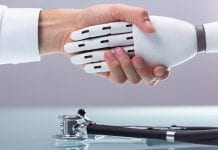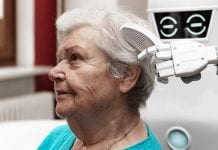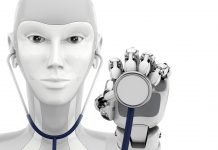Artificial Intelligence Related News
New AI tool can predict life expectancy in heart failure patients
Physicists and cardiologists have utilised machine learning to come up with a new algorithm.
This new Artificial Intelligence algorithm can predict life expectancy in heart...
Could AI improve care for patients with kidney failure?
A new study has shown that artificial intelligence technology may improve care for patients needing dialysis.
Machine learning, a form of artificial intelligence, may help...
The UK government are funding elderly care robots
A new research programme, launched by the British government, will aim to make autonomous systems safe and trustworthy for public use.
The £33.9m (~€39.3m) research...
Using AI to support people with long term illnesses
A partnership, between a social enterprise and four UK health charities, is working to create the UK’s first AI coaching tool to support those...
AI in healthcare: Microsoft reports promising uptake
A survey on the use of Artificial Intelligence (AI) in the UK healthcare industry has revealed that 46% of NHS leaders reported that their...
New cancer research using imaging, robotics and AI
An international team of researchers will utilise new technologies in imaging, robotics and Artificial Intelligence (AI) in order to detect early stage cancers.
A team...
Learn about the artificial skin that creates the first ticklish device
A new interface developed by researchers in Bristol and Paris takes touch technology to the next level, by providing an artificial skin-like membrane for...
Connecting the digital health ecosystem with DigiHealth
The inaugural DigiHealth leaders conference is connecting the digital health ecosystem together for strategy, partnering, investment & deal-making opportunities.
The Network for Life Science Executive...
MEDICA: prevention, diagnostics and therapy in digital health
Healthcare is going digital worldwide at an incredibly rapid pace, and the world-leading medical trade fair MEDICA will be showcasing all things digital health.
In...
The encouraging increase of AI in UK healthcare
Explore how Microsoft UK has reported an ‘encouraging increase’ in the use of AI in UK healthcare – could we see a boom in...
Wearable medical devices: explore the global overview
As digital technology becomes increasingly integrated into the practice of medical care, wearable medical devices are evolving both technologically and physically.
An estimated one in...
The AI tech bubble will burst if it can’t prove itself beyond hype
While digital health investment continues to gather pace, many health tech startups are failing to materialise into long lasting impact, here Roeland Pater of...
How Artificial Intelligence can revolutionise healthcare
Health Europa spoke to Joerg Aumueller from Siemens Healthineers about the company’s views and strategy to apply artificial intelligence into the clinical routine and...
The artificial intelligence lab: what will investment in AI mean for the healthcare industry?
In healthcare, tech has already been used to update patient records, improve care delivery and streamline processes – could the introduction of an artificial...
AI-based smart speakers in healthcare: a game changer or a fad?
Did you know that the market volume of virtual assistants including chatbots and smart speakers in healthcare is expected to hit $1.7 billion by...
Technology in healthcare requires value focused leadership
Discover how the NHS is evolving and adapting to technological advances thanks to pioneering leaders – could technology in healthcare be effectively executed in...
AI systems vs. cancer: diagnosis, treatment, follow-up
From surgery assistance to virtual nursing, next-level AI systems help healthcare providers to facilitate and accelerate cancer diagnostics and treatment response.
As global computational powers...
Diagnosing heart disease just got easier with a new imaging tool
Reduced blood flow to the heart muscle is the leading cause of death in the Western world, and now researchers are first to develop...
Improving patient experience and outcomes using virtual cognitive assistants
Virtual cognitive assistants could drastically reduce the administrative burden on NHS staff, leading to improved patient experience and health outcomes.
It’s becoming widely accepted that...
AI could prevent unneeded tests in those with stable chest pain
According to researchers, a new form of AI has the ability of saving one hour of testing per patient, in particular those with stable...





















